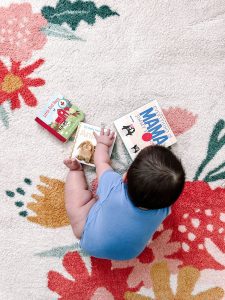 My first love was reading. I remember the very first book I fell in love with was “Chicka Chicka Boom Boom” in my kindergarten teacher’s classroom on her big round circle time rug. Over the years, my love for reading grew into a love for writing and the rest is history. When I finally became a mom, I knew that I wanted to instill the value of reading in my daughters.
My first love was reading. I remember the very first book I fell in love with was “Chicka Chicka Boom Boom” in my kindergarten teacher’s classroom on her big round circle time rug. Over the years, my love for reading grew into a love for writing and the rest is history. When I finally became a mom, I knew that I wanted to instill the value of reading in my daughters.
Then, one day I saw some pretty daunting statistics and realized the importance of early literacy:
- By 3 years of age, there is a 30 million word gap between children from the wealthiest and poorest families.
- 34% of children entering kindergarten lack the basic language skills needed to learn how to read.
- 65% of fourth graders read at or below the basic level.
While it can be challenging to find time to sit with our children to read, the laundry is never-ending and our to-do list is ever-growing, here are a few tips to help encourage your youngest children to become readers.
Reading Tips for Babies & Toddlers
- Emphasize rhythms and rhymes in stories.
- Encourage your child to repeat what you say or comment on it. Encourage your child to ask questions. Provide models of interesting questions and examples of possible answers. “I wonder what is going to happen next? I think the rabbit will get lost because he is not paying attention to where he is going. What do you think?”
- Look for books that are about things that interest your child. For example, does your child like cars, insects, or animals?
- Read with emotion using different voices for different characters.
- Snuggle with your child with her favorite blanket or toys as you read.
What about your older children? Even though your child may be able to read, they still need you to read with and to them.
Reading Tips for School-Aged Children
- Keep reading to your child even when they can read.
- Talk with your child about reading preferences that are beginning to develop. Ask whether she likes adventure stories, mysteries, science fiction, animal stories, or stories about other children. Encourage her to explain the reasons for preferences.
- Take turns reading a story with your child. Don’t interrupt to correct mistakes that do not change the meaning.
- Talk about the meaning of new words and ideas introduced in books.
There are several benefits to reading, but reading at home opens up a new door and appreciation for reading that can last a lifetime.











